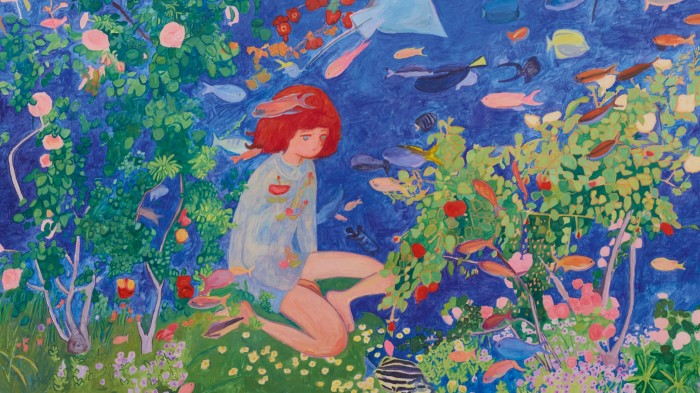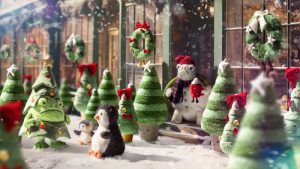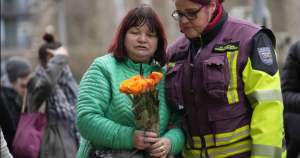These paintings will put a spell on you

Unlock the Editor’s Digest for free
Roula Khalaf, Editor of the FT, selects her favourite stories in this weekly newsletter.
The art world is in the midst of a mystical moment. While 20th-century painters such as Remedios Varo and Swedish spiritualist Hilma af Klint are being given new prominence, myriad scenarios are being magicked up in more contemporary works. They range from the lush imaginary landscapes inhabited by part-human creatures of young British painter Georg Wilson, to the hyper-whimsical anime-inspired fantasies of Japanese artist Makiko Kudo. In Montreal, Tuan Vu creates dreamlike scenes imbued, he says, with the “spiritual thinking” of 19th-century French symbolist Odilon Redon. Meanwhile, María Berrío’s bold compositions, collaged with layers of delicate Japanese paper, summon a cast of characters that merge into rivers, frolic with tigers and occasionally sprout wings.

“To me, enchantment is when you look at a piece of art, and you don’t know exactly why but you can’t stop looking at it,” says Colombia-born, New York-based Berrío, whose work is currently on show at Victoria Miro’s London gallery. “I create stories that come from things happening in reality. But I use mythology and folklore to transform them into an imaginary world.” Her images combine memories of her childhood in South America – “stories told by my grandmother and my mother; playing in the garden, gathering flowers, glueing them to your face” – with life in New York, where she has lived for almost 25 years. “There’s a sense of longing,” she says. “It’s a bit like magical realism.”

All things woo-woo have been bubbling up into the mainstream for some time. Tarot is trendier than ever. Celebrities are signing up “spiritual mentors”, and Gen-Zers are spell-swapping on WitchTok. It’s part of “a broader cultural shift towards alternative spiritualities and a deliberate move away from materialistic constraints”, writes Rachel Thomas, chief curator of the Hayward Gallery, in the essay that accompanied Enchanted Alchemies: Magic, Mysticism and the Occult in Art at Lévy Gorvy Dayan’s London gallery. The exhibition, including works by Ithell Colquhoun, Leonora Carrington and Leonor Fini, was put together to celebrate the 100-year anniversary of André Breton’s first Manifesto of Surrealism.

Surrealism is also the subject of a major exhibition at Paris’s Pompidou Centre (until 13 January), and a new show at The Hepworth Wakefield, Forbidden Territories: 100 Years of Surreal Landscapes. Here too there are contemporary takes, such as a fairytale forest by Swiss artist Nicolas Party or a Berrío work in which a woman nestles into a rocky outcrop. In London, meanwhile, Huxley-Parlour Gallery’s current group show explores the role of the fantastical and the power of the imaginary. The Silver Cord (the name given in metaphysical studies to the thread that joins the physical and astral bodies) features 17 artists conjuring up wildly quixotic worlds, from Sonia Jia’s hazy emotional realms to the sublime and stately landscapes of Sholto Blissett.

The magical elevation of nature is a recurring theme. Chinese artist Yu Hong, for example, depicted fantastical seaworlds in Islands of the Mind, a recent Lisson Gallery show. The immense and magnetic canvases illustrated suffering but also love, disenchantment as well as enchantment, each made more powerful by the contrast between the two. In Island of Life (2024), a couple (shown only by their legs) float into the sunset under an apple tree, accompanied by a nest of storks.

Animals abound in this strange utopia too. For Korean-Canadian artist Zadie Xa, whose work will be included in Sharjah Biennial 16 in February, urban animals are intertwined with mythology and folklore. Her ethereal paintings feature bird-headed humans, nine-tailed foxes and a seagull that morphs into a seashell. And at Richard Saltoun’s London gallery next month, Jennifer Binnie’s intuitive paintings fuse human and animal forms. “Enchantment and magic are everything – the essence of the unknowable,” says Binnie. “I hope my paintings invite viewers into a world that offers more questions than answers.”

These are works that offer fantasy and escapism. But “it’s not a question of denying the bad things happening in the world”, says Tuan Vu, an engineer who returned to painting four years ago and will exhibit at next month’s Art Singapore with Kristin Hjellegjerde gallery. “For me, it’s about how to be a human living on earth.” The 53-year-old was born in Vietnam, and his experiences of war, imprisonment and fleeing the country by boat taught him how to find hope in adversity. “Now I concentrate on the beautiful things.”

Disney provides further inspiration. One of Vu’s early influences was Fantasia, and Xa’s first artistic passion was ignited by The Little Mermaid. Devon-based Alexis Soul-Gray’s painting Happy Birthday Alice (2024) features Bambi alongside images from vintage knitting and embroidery patterns. Memory Play, her solo show that opens at Bo Lee and Workman in Bruton in January, presents, Soul-Gray says, “a gathering of fragmented memories, becoming closer to a fairytale utopia than reality”.
The appeal of magical paintings is perhaps an active form of re-enchantment. For gallery-goers, these experiences can be “transformative”, says Victoria Gelfand-Magalhaes, a senior partner at Lévy Gorvy Dayan, but you have to use your own imagination: “It’s almost like the magic happens in the viewer’s eyes.”
#paintings #put #spell







